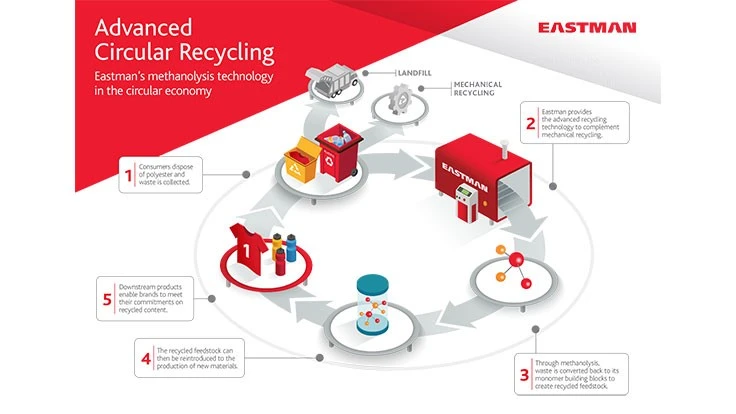
Leading specialty materials company Eastman, Kingsport, Tennessee, has announced that it will pursue the launch of circular recycling technology that uses polyester scrap that cannot be recycled using mechanical methods currently available. Using the process of methanolysis, Eastman says its technology breaks down polyester-based products into their polymer building blocks, which can be reintroduced to produce new polyester-based polymers.
In a news release announcing the launch, Eastman says it has more than three decades of expertise in methanolysis, making the company “uniquely qualified to be a leader in delivering this solution at commercial scale.”
The technology enables the recycling of low-quality polyester, or polyethylene terephthalate (PET), scrap that would typically be diverted to landfills into high-quality polyesters suitable for use in a variety of end markets, including food-contact applications, according to the company.
“We recognize that plastic waste is a complex problem that needs advanced solutions. As we have engaged potential partners, it is clear there is high interest across the entire value chain,” says Mark Costa, Eastman board chair and chief executive officer. “Our long history of technical expertise in chemical processes, including methanolysis, and our leading position in copolyester
Eastman says it is executing an engineering feasibility study on the design and construction of a commercial scale methanolysis facility to meet its customers’ demands and has engaged in initial discussions with potential partners across the value chain regarding the development of such a facility. The company’s goal is to be operating a full-scale, circular recycling facility within 24 to 36 months.
The company says its efforts to find new end-of-life solutions to advance the circular economy align with its “innovation-driven growth strategy and commitment to
“We believe we have an obligation to enhance the quality of life in a material way,” says David Golden, senior vice president, chief legal and sustainability officer
For more information, visit www.eastman.com/Circular-Economy.
Latest from Recycling Today
- Orion ramping up Rocky Mountain Steel rail line
- Proposed bill would provide ‘regulatory clarity’ for chemical recycling
- Alberta Ag-Plastic pilot program continues, expands with renewed funding
- ReMA urges open intra-North American scrap trade
- Axium awarded by regional organization
- Update: China to introduce steel export quotas
- Thyssenkrupp idles capacity in Europe
- Phoenix Technologies closes Ohio rPET facility





